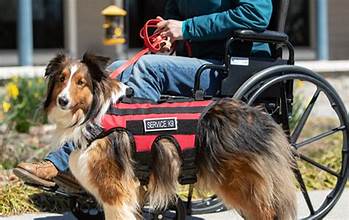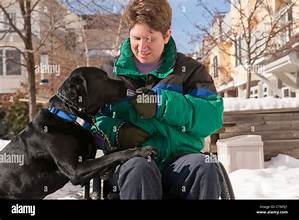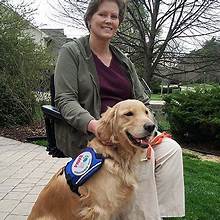Understanding Multiple Sclerosis (MS)
Multiple Sclerosis (MS) is a chronic autoimmune disease that affects the central nervous system, disrupting communication between the brain and body. Symptoms vary from person to person but may include muscle weakness, fatigue, balance problems, vision changes, and cognitive challenges. Because MS can cause both physical and emotional difficulties, many people find that a service pet can significantly improve their quality of life.
How Service Pets Help People With MS
1. Mobility Assistance
MS can affect muscle strength, coordination, and balance. Mobility service dogs can:

- Provide physical support while walking
- Retrieve dropped items
- Open doors and cabinets
- Help a person rise from a seated position.
These tasks can reduce the risk of falls and help conserve energy.
2. Fatigue Management
Fatigue is one of the most common symptoms of MS. Service dogs can assist by:
- Carrying lightweight items in a backpack or harness
- Pushing accessible door buttons
- Helping with household tasks like fetching mail
This allows the person to save energy for other activities.
3. Emotional Support
Although emotional support animals (ESAs) are different from trained service dogs, service animals often provide emotional comfort as part of their companionship. For someone living with MS, this emotional connection can reduce stress and improve mental health. It’s essential to note that while ESAs provide emotional support, service dogs are specifically trained to perform tasks that directly assist individuals with their disabilities.
4. Safety and Independence
MS can cause sudden symptoms, such as dizziness or leg weakness. Service dogs can:
- Alert others in case of a medical emergency
- Help guide the person to a safe place to sit or lie down.
- Bring a phone or a medical alert device.e
This type of assistance provides greater independence and peace of mind.
How to Qualify for a Service Pet for MS
These tasks can include, but are not limited to: opening doors, retrieving items, turning on lights, and providing physical support while walking. Under the Americans with Disabilities Act (ADA), a person with MS may qualify for a service animal if their disability substantially limits one or more major life activities, and if the dog is trained to perform tasks directly related to their disability.

Steps to get a service dog:
- Consult your healthcare provider to determine eligibility.
- Apply through a reputable service dog organization that trains animals for mobility or medical assistance. This process typically involves an application, an interview, and a period of training and bonding with the dog.
- Consider the time commitment — service dogs require care, training, and bonding.
Final Thoughts
For people living with Multiple Sclerosis, service pets can provide far more than companionship — they can be vital partners in daily life, offering assistance, safety, and emotional comfort. With proper training and the right match, a service dog can empower someone with MS to live more independently and confidently.




